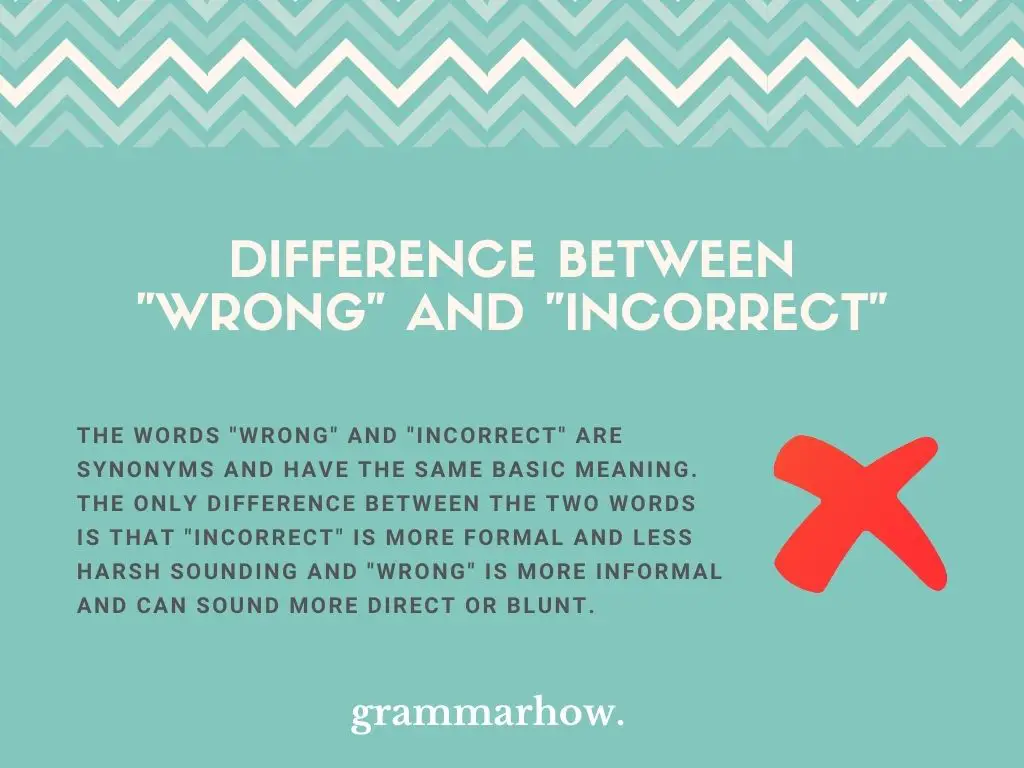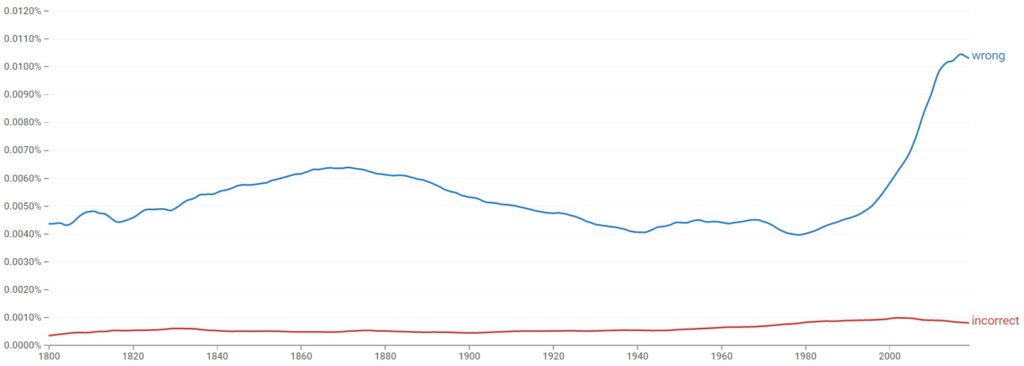The words “wrong” and “incorrect” are synonyms, but there is a slight difference in when you should choose to use one over the other. Here we discuss this difference and provide guidance on choosing which word to use depending on the context of the situation.
What Is The Difference Between “Wrong” And “Incorrect”?
The words “wrong” and “incorrect” are synonyms and have the same basic meaning. The only difference between the two words is that “incorrect” is more formal and less harsh sounding and “wrong” is more informal and can sound more direct or blunt.

What Does “Wrong” Mean?
The word “wrong” means that something goes against what is accepted as the right or standard way of doing something or that some information that is not true is being presented. It is often seen as informal and blunt.
The Cambridge Dictionary defines “wrong” as “not correct” and also as “not suitable or correct, or not as it should be.”
It can also imply that something is not morally accepted by the majority of people, that something was done that is unfair or can indicate a feeling that somebody has about something.
Here are some examples of the word “wrong” used properly in a sentence.
- It is important to teach children it is always wrong to lie and they should tell the truth.
- Sorry that I’m late, I took a wrong turn and had to re-route myself.
- I went to three doctors already and not one of them can figure out what exactly is wrong with me.
- I made the wrong decision to decline the invite to the party. Everyone said that they had a great time there!
What Does “Incorrect” Mean?
The word “incorrect” also indicates that something is not what it should be or does not follow certain standards or rules or lacks the proper order. It is a more formal way of saying that something is “wrong” and is more often used in the written word and business situations.
The Cambridge Dictionary defines “incorrect” as “not correct or not true,” and “not acceptable or not as it should be.”
You can see that this definition overlaps the definition for the word “wrong,” showing that the two words are synonyms for each other and can therefore be used interchangeably.
Here are some examples using the word “incorrect.”
- Four of the answers on your test were incorrect, you should have studied a bit harder.
- I couldn’t find Mr. Swanson in the system because whoever entered the information had the incorrect spelling of his name.
- You were incorrect in your assumptions about him, he actually is a very serious student.
- The time of the meeting was incorrect in my calendar, which is why I missed it.
Is “Wrong” Or “Incorrect” Most Formal?
The word “incorrect” is more formal than the word “wrong,” and should be chosen for use in business situations or other times when you want to sound less blunt and more professional. It is also the preferred version to use in the written word.
The word “wrong” has a stronger connotation and tends to suggest a more serious infraction than “incorrect.” This is most likely the reason why street signs and other types of warning signs use the word “wrong” instead of “incorrect” (i.e., “wrong way” signs).
For example:
- The accident was caused by a driver going the wrong way on the road.
- The accident was caused by a driver going the incorrect way on the road.
Both of the sentences mean the same thing and would be understood correctly in both instances. However, the first sentence sounds more appropriate for the situation because the consequences of driving the wrong way are serious so a stronger word is more appropriate.
The same is true of these examples, but with the opposite situation where “incorrect” would be the better word to choose.
- Unfortunately, your hypothesis about the science experiment was wrong.
- Unfortunately, your hypothesis about the science experiment was incorrect.
See how in these examples, since the outcome of being wrong is not as serious, the word “incorrect” conveys the message more professionally and politely.
Are “Wrong” And “Incorrect” Interchangeable?
Since the words “wrong” and “incorrect” and synonyms, they can be used interchangeably and the sentence will retain the same meaning and be able to be properly understood by the audience.
As mentioned earlier, the word preference comes down to the context of the situation and the tone that the speaker wants to convey. For a more professional, not as blunt tone, use the word “incorrect.” For a stronger, less formal tone, use the word “wrong.”
Is “Wrong” Or “Incorrect” Used The Most?
In the English Language, the word “wrong” is more popularly used than the word “incorrect.” This trend suggests that an informal tone is preferred most of the time, or that when people want to call out an error, they want to make sure that their point is clearly heard.
The Google Ngram Viewer here clearly shows this trend. From as far back as the 1800s, the word “wrong” has always been used more than the word “incorrect,” and since the mid-1990s, it has been used even more frequently, creating a bigger gap in usage between the two words.

Is It “Wrong English” Or “Incorrect English”?
Since the words “wrong” and “incorrect” are able to be used interchangeably, both the phrases “wrong English” and “incorrect English” are grammatically correct. However, in most cases, the phrase “incorrect English” would be preferred because it sounds a little more subtle.
Look at these examples to see what we mean.
- He chose the wrong English phrase to convey his message and it led to a misunderstanding.
- He chose the incorrect English phrase to convey his message and it led to a misunderstanding.
See how both sentences mean the same thing and are easily understood. However, the second sentence sounds a bit more polite and formal.
“Wrong” And “Incorrect” – Synonyms
There are many words that mean the same thing as “wrong” and “incorrect.” Some of the more popular synonyms are:
- Mistaken
- False
- Erroneous
- Untrue
- Inaccurate
- Unfounded
- Not Right
- Invalid
You may also like:
“You’re Wrong” vs. “You’re Mistaken” – Difference Explained
